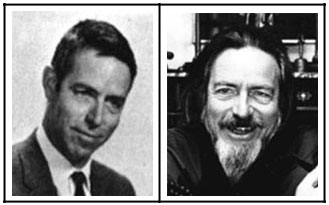Alan Watts
Alan Wilson Watts (6 January 1915 – 16 November 1973) was a British philosopher, writer, and speaker, best known as an interpreter and popularizer of Eastern philosophy for Western audience. Born in Chislehurst, England he moved to the United States in 1938 and began Zen training in New York. He attended Seabury-Western Theological Seminary, where he received a master's degree in theology. Watts became an Episcopal priest but left the ministry in 1950 and moved to California, where he joined the faculty of the American Academy of Asian Studies. Living on the West Coast, Watts gained a large following in the San Francisco Bay Area while working as a volunteer programmer at KPFA, a Pacifica Radio station in Berkeley. Watts wrote more than 25 books and articles on subjects important to Eastern and Western religion. His first bestselling book on Buddhism was 'The Way of Zen' (1957). In 'Psychotherapy East and West' (1961), Watts proposed that Buddhism could be thought of as a form of psychotherapy and not just a religion. Like Aldous Huxley before him, he explored human consciousness in the essay, 'The New Alchemy' (1958), and in the book, 'The Joyous Cosmology' (1962).
Towards the end of his life, he divided his time between a houseboat in Sausalito and a cabin on Mount Tamalpais. His legacy has been kept alive by his son, Mark Watts, and by many of his recorded talks and lectures that have found new life on the Internet (www.alanwatts.com). According to the critic Erik Davis, his "writings and recorded talks still shimmer with a profound and galvanizing lucidity."
Though known for his Zen teachings, he was equally if not more influenced by ancient Hindu scriptures, especially Vedanta, and spoke extensively about the nature of the divine Reality Man that Man misses, how the contradiction of opposites is the method of life and the means of cosmic and human evolution, how our fundamental Ignorance is rooted in the exclusive nature of mind and ego, how to come in touch with the Field of Consciousness and Light, and other cosmic principles. These are discussed in great detail in dozens of hours of audio that are in part captured in the ‘Out of Your Mind’ series.
On the personal level, Watts sought to resolve his feelings of alienation from the institutions of marriage and the values of American society, as revealed in his classic comments on love relationships in "Divine Madness" and on perception of the organism-environment in "The Philosophy of Nature".
In looking at social issues he was quite concerned with the necessity for international peace, for tolerance and understanding among disparate cultures. He also came to feel acutely conscious of a growing ecological predicament; as one instance, in the early 1960s he wrote: “Can any melting or burning imaginable get rid of these ever-rising mountains of ruin—especially when the things we make and build are beginning to look more and more like rubbish even before they are thrown away?"
As part of his growing popularity, Matt Stone and Trey Parker—creators of the animated series South Park—have also contributed a video tribute by animating some of his lectures. This has spawned a culture of user animated videos all around the net.
FurryCarlos Productions (Matt Stone & Trey Parker) • Fear of Enlightenment • Life & Music • Earth is People-ing • Prickles & Goo z
|
